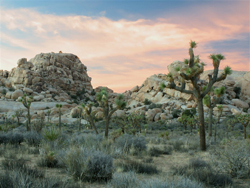Lectures
Lecture 9

T. Coraghessan Boyle
T. Coraghessan Boyle was born Thomas John Boyle in 1948 in Peekskill, New York. He went to college at the State University of New York at Potsdam, and then received his Ph.D. at the University of Iowa. Since 1976, he has taught at the University of Southern California, where he founded the undergraduate Creative Writing Program. He lives near Santa Barbara with his wife and three children.
Boyle did not intend to become a writer. The son of parents who were both alcoholics, he was a difficult child, often in trouble, and not thought to be very bright. In second grade, he was placed in a class for slow learners. He spent a good bit of his time as a teenager drinking and using drugs. He enrolled in the music program at SUNY, but admits that he spent most of his time drinking and getting stoned. He enrolled in a creative writing course on a whim, and found himself at home. "Art bailed me out," he says. "It sounds corny but there's a power in it that I would never give up. There's a light that fills you when you're writing; there's a magic. I don't know what it is. It's a miracle and it's a rush and immediately on finishing, you want to do it again. It's so utterly thrilling to me it's all I want to do." (Ermelino)
After college, he got a job as a high school English teacher (mostly, he says, to avoid being drafted into the military during the Vietnam War) and continued writing short stories. He applied to the University of Iowa's Writers' Workshop and was accepted. There, he studied under John Irving and Vance Bourjaily.
Boyle's specialty is satire, and not subtle satire, either: he doesn't hold back on any issue. Sandy Bauers, in a review of Without a Hero, wrote, "Boyle is superbly demented. He's the court jester of modern society, tweaking our icons. These are the sort of stories that the kid who flicked spitballs at the blackboard in grade school would write. Only now the kid has grown up; he has more finesse. Boyle's stories are more than funny, better than wicked. They make you cringe with their clarity. . . . [Boyle is] the absolute genius of description."
The Tortilla Curtain is Boyle's most controversial work. It was described by its publisher as a "Grapes of Wrath for the 1990s." Barbara Kingsolver, writing in the Nation, explained how the novel "addresses what has probably always been the great American political dilemma: In a country that proudly defines itself as a nation of immigrants, who gets to slam the door on whom?...What Boyle does, and does well, is lay on the line our national cult of hypocrisy. Comically and painfully he details the smug wastefulness of the haves and the vile misery of the have-nots."
Following is a list of Boyle's books:
- Descent of Man. Boston: Atlantic-Little, Brown, 1979
- Water Music. Boston: Atlantic-Little, Brown, 1981
- Budding Prospects. New York: Viking, 1984
- Greasy Lake. New York: Viking, 1985
- World's End. New York: Viking, 1987
- If the River Was Whiskey. New York: Viking, 1989
- East Is East. New York: Viking, 1990
- The Road to Wellville. New York: Viking, 1993
- Without A Hero. New York: Viking, 1994
- The Tortilla Curtain. New York: Viking, 1995
- Riven Rock. New York: Viking, 1998
- T.C. Boyle Stories. New York: Viking, 1998
- A Friend of the Earth. New York: Viking, 2000
- After the Plague. New York: Viking, 2001
- Drop City. New York: Viking, 2003
- The Inner Circle. New York: Viking, 2004
- Tooth and Claw. New York: Viking, 2005
- The Human Fly. New York: Viking, 2005
- Talk Talk. New York: Viking, 2006
- The Women. New York: Viking, 2009
- Wild Child. New York: Viking, 2010
- When the Killing's Done. New York: Viking, 2011
If you'd like more information on any of the topics covered in this lecture, go to the Links page. Enjoy!
Some of the information in this lecture derives from:
1. "Boyle, T(homas) Coraghessan (1948-)." Major 21st-Century Writers. Ed. Tracey Matthews and Tracey Watson. Vol. 1. Detroit: Gale, 2005. Gale Virtual Reference Library. Web. 25 Oct. 2010.
2. Michael Adams, "T. Coraghessan Boyle," Critical Survey of Short Fiction, Second Revised Edition © 2001 by Salem Press, Inc.
3. Ermelino, Louisa. "According to Boyle." Publishers Weekly 19 June 2006: 24+. Literature Resource Center. Web. 25 Oct. 2010.
When it's 100 degrees in New York, it's 72 in Los Angeles. When it's 30 degrees in New York, in Los Angeles it's still 72. However, there are 6 million interesting people in New York, and 72 in Los Angeles. ~ Neil Simon
